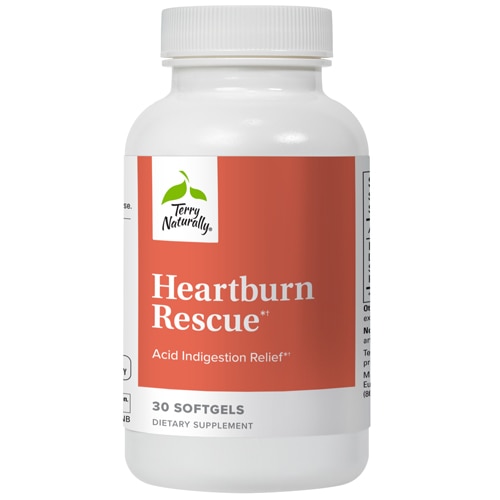Have you ever eaten too much and experienced a feeling of burning or pressure in your chest? You may have been suffering from heartburn, otherwise known as gastroesophageal reflux, or GERD. It means that the acids normally present in your stomach may have “washed up” into your esophagus and caused irritation. If you’ve experienced this issue, there’s good news: you can naturally support healthy digestion, thereby preventing or reducing occasional heartburn. Here are eight tried-and-true remedies for heartburn to try.
Avoid overeating. When you eat more than your stomach can handle, there is increased pressure on the lower esophageal sphincter (LES) that keeps your stomach separated from your esophagus. When this sphincter can’t do its job of staying closed after foods or beverages have passed through it, heartburn can occur. People who experience indigestion pain should consider eating smaller, more frequent meals, rather than fewer large meals.
Eat your last meal of the day at least four hours before you lie down to sleep.If you eat a large, heavy meal, and then go to bed, the LES may open up and allow stomach contents to reflux upward. Making sure that you don’t overfill your stomach before lying down can make a significant difference.
Don’t drink a lot of fluid before going to bed.Fluids can also overfill the stomach and put pressure on the LES, especially if you're already experiencing reflux symptoms some of the time. Try drinking most of your fluids in the earlier part of the day.
Refrain from drinking a lot of fluids with meals.I was surprised to learn, when I lived in Europe, that people there often don’t have pitchers of water or milk on the table when they eat their meals. In fact, they often avoid drinking fluids with meals altogether. There may be some medical soundness to this practice, as drinking lots of fluids at mealtimes will increase the volume of stomach contents, potentially putting increased pressure on the LES and leading to heartburn. In addition, drinking large quantities of fluids could dilute stomach acids, which in turn could result in a less efficient breakdown of food by the diluted acids.
Take the stress off of your stomach by eating high quality food.Be aware that fatty, fried, and greasy foods generally cause food to stay in your stomach for longer periods of time, which can aggravate symptoms of heartburn. They can also make you feel nauseated, bloated, and constipated. Some fats are good for you, but even healthy fats like olive oil, coconut oil, and flax seed oil should be used in moderation. Note: be sure to not cook with flax oil; use it only on already cooked foods, or in your salad dressings.
Support your overall well-being with a healthy diet.Eat just the right amounts of foods that promote health - not only in your stomach, but also in your whole body. These foods include steamed greens, salads, lean meats, nuts, beans, legumes and complex carbohydrates like brown rice and quinoa.
Steer clear of heartburn-promoting foods.If you experience heartburn frequently, in addition to the suggestions above, avoid ingesting spicy foods and acidic foods like citrus, tomatoes, and vinegar. Consumption of alcohol can also aggravate heartburn symptoms, so avoid alcohol altogether.
Know that stress can aggravate heartburn.It has been well documented that unmitigated stress can significantly contribute to heartburn. If you know you’re about to go into a stressful period in your life, make a point of following the suggestions outlined above. By following these steps, shifting some simple things in your life, and making healthier choices, you can combat heartburn and have much healthier and more optimally functioning digestion. The bottom line is that you can prevent or reduce the symptoms of heartburn - while you’re taking other steps to decompress from stressful events in your life.




